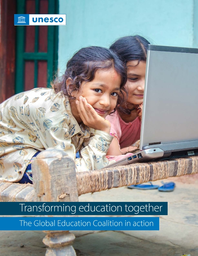العودة

Transforming education together: the Global Education Coalition in action
المنشورات
2023 - 04 - 28

As countries prepare for a digitally-driven future, they turn to their educational institutions to equip learners with the necessary abilities and knowledge to safely, creatively, and sustainably interact with the expanding digital world.
As part of the TES follow up process, the Global Education Coalition has created the Digital Transformation Collaborative (DTC), a subgroup gathering the Global Education Coalition’s 200+ Members. DTC members are interested in going beyond piloting projects and in investing in partnerships with countries to help education systems develop their digital ecosystems.
The present progress report examines the Coalition's role as an example of international solidarity and cooperation during times of crisis. It also provides a detailed action plan with four missions and the Digital Transformation Challenge (DTC) as its cornerstone. Additionally, the report will cover the Coalition's characteristics, activities, core areas of focus, and the insights gained in the last 12 months. Finally, the report will consider the GEC's strategic objectives for the future, such as the expansion of the DTC and the introduction of in-country activities to facilitate digital transformation in education.
It is noteworthy to mention that on 28 March 2023, the third anniversary of the establishment of the Global Education Coalition, UNESCO held the first in-person Member Meeting at its headquarters in Paris, bringing together all 208 members of the Coalition, as well as Member States. The Coalition is carrying out and expanding its four major objectives regarding skills, teachers, catch-up learning, and gender. At the same time, the members are collaborating to compile data, support, and exchange information about major challenges and solutions in education.
To learn more about the Global Education Coalition report: https://unesdoc.unesco.org/ark:/48223/pf0000384812
أحدث المنشورات
القائمة الكاملةاليونسكو
المستقبل على المحك: لماذا الاستثمار في التعليم أمر بالغ الأهمية؟
يسلط هذا التقرير، الذي أعدّته اللجنة التوجيهية الرفيعة المستوى المعنية بالهدف الرابع من أهداف التنمية المستدامة (SDG4) بالتعاون مع الشراكة العالمية من أجل التعليم (GPE) ونُشر في عام 2024، الضوء على الحاجة المُلِحّة لتعزيز الاستثمار في التعليم كوسيلة أساسية لمواجهة التحديات العالمية، بما في ذلك تغيّر المناخ، والتطورات التكنولوجية، والتحوّلات الديموغرافية.
اليونسكو
المدن العربية تتألق في جوائز مدن التعلم لليونسكو لعام 2024
تُحرز المدن العربية تقدمًا كبيرًا في مجال التنمية المستدامة والتعلم مدى الحياة، مع تركيز متزايد على إنشاء بيئات تعليمية شاملة تُسهم في تحقيق الأهداف التنموية المحلية والعالمية. وقد احتفلت جوائز مدن التعلم لعام 2024، التي تُمنح من قِبَل اليونسكو، بهذه الجهود، مبرزةً المدن العربية التي تميزت في بناء مجتمعات تعليمية.
اليونسكو
مؤتمر اليونسكو العالمي الثالث للموارد التعليمية المفتوحة: تعزيز الوصول الشامل إلى المعرفة
انطلق مؤتمر اليونسكو العالمي الثالث للموارد التعليمية المفتوحة (OER) في 19 نوفمبر/تشرين الثاني 2024، في مركز دبي التجاري العالمي في دولة الإمارات العربية المتحدة، ليكون المرة الأولى التي يُستضاف فيها هذا الحدث في العالم العربي. نظّم مؤتمر اليونسكو بالتعاون مع مؤسسة محمد بن راشد آل مكتوم للمعرفة (MBRF)واستقطب أكثر من 500 مشارك ومشاركة من نخبة القادة العالميين، وصنّاع السياسات، وممثلي المؤسسات التعليمية، بما في ذلك وزراء، وأكاديميون، وخبراء من القطاع الخاص. وتركّزت المناقشات على مدار يومين حول تعزيز الاستفادة من الموارد التعليمية المفتوحة والتقنيات الناشئة، بهدف تحقيق وصول عادل وشامل إلى التعليم، وتقليص الفجوة الرقمية على الصعيد العالمي.
اليونسكو
الأمم المتحدة تحتفي في شهر ديسمبر/كانون الأول بحقوق الإنسان، والأشخاص ذوي الإعاقة، واللغة العربية
تُحيي الأمم المتحدة في شهر ديسمبر/كانون الأول ثلاث مناسبات بارزة تُعنى بحقوق الإنسان، وبحقوق الأشخاص ذوي الإعاقة، وباللغة العربيّة، ممّا يجعل هذا الشهر فرصةً عالميّةً للتفكير والعمل. وتقود اليونسكو الجهود لتعزيز التعليم الشامل، وحماية حقوق الإنسان، والاحتفاء بالإرث الثقافيّ واللغويّ للّغة العربيّة، من خلال سلسلة من الفعاليات والمبادرات.